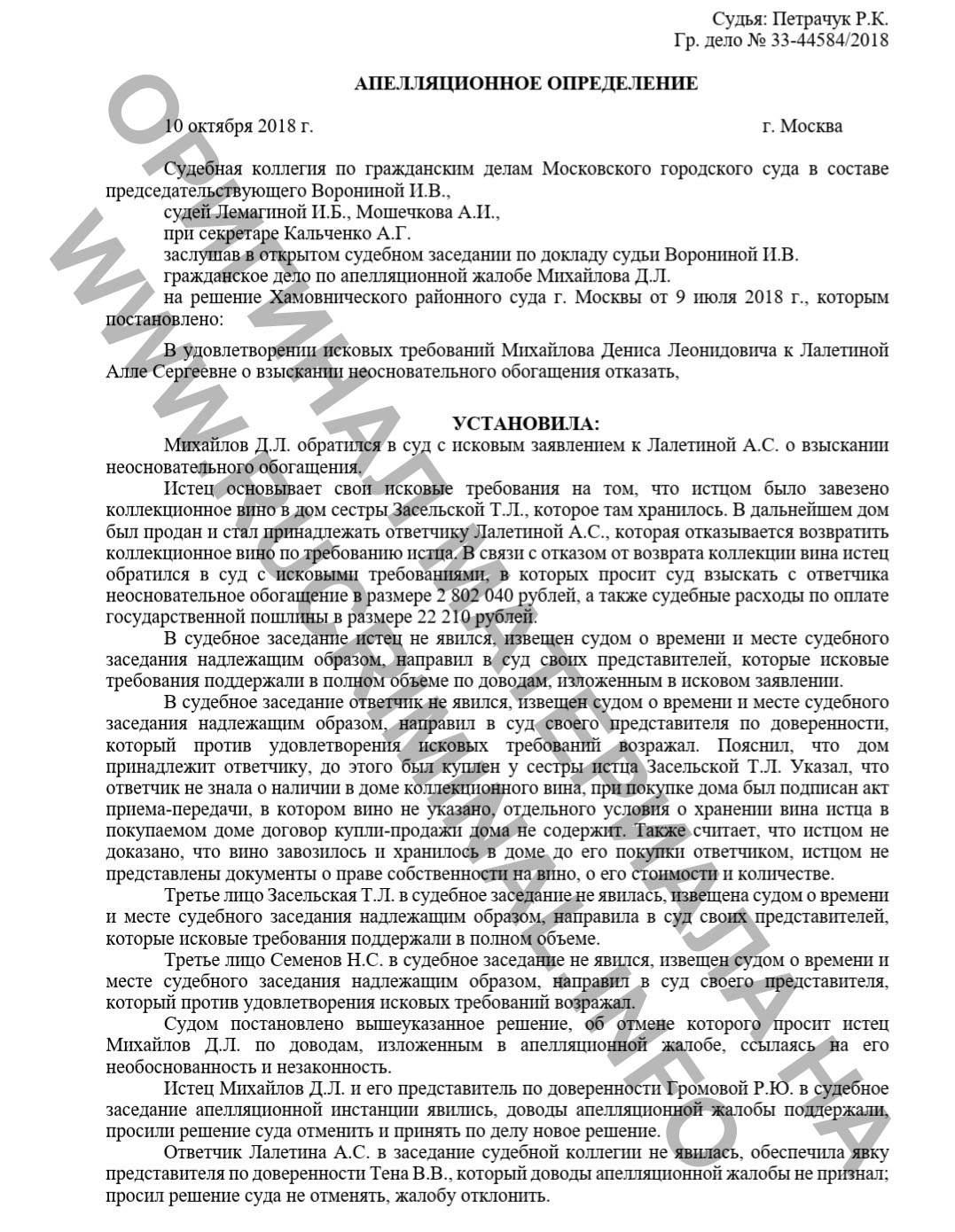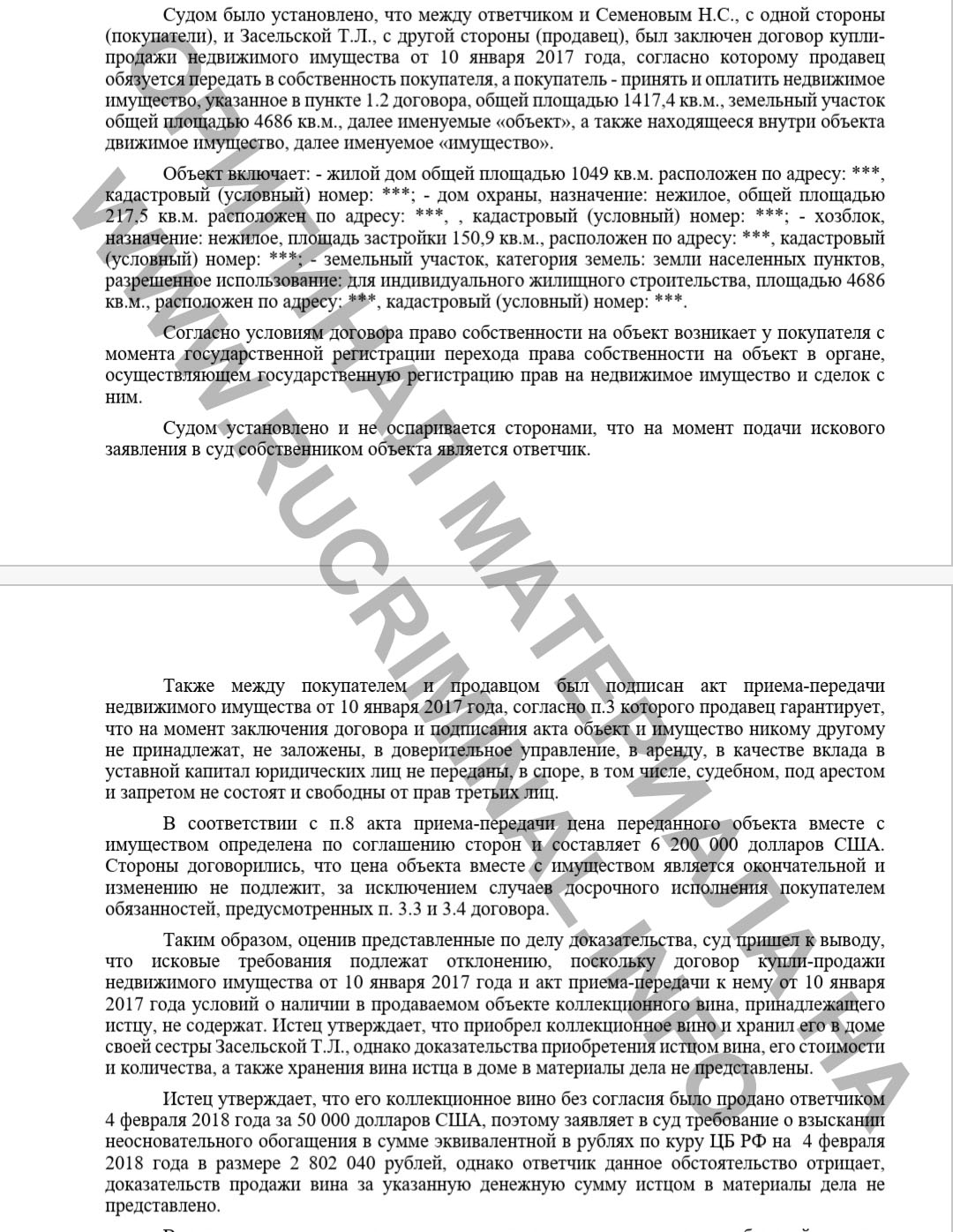They quarreled in the literal sense because of the “trifle”. The banker, now the former Deputy Minister of Economic Development, Petr Zaselsky, built schemes according to which state funds received through Rosatom and Rostec were safely “sawed”.
Alla Laletina, a top manager of Rostec, was also a participant in these schemes. The “holder” of the common fund from the stolen funds was the brother of Zaselsky’s wife, Denis Mikhailov. He invested hundreds of millions of dollars in real estate in the USA, Monaco, Russia, in the purchase of antiques at Sotheby’s, etc. In 2017, Laletina was tired of hiding her real wealth behind Mikhailov’s back (at that time, many officials stopped being shy and afraid and began to come out of the shadows) and asked to sign a cottage on Rublyovka for her. Only on “paper” its cost was 6.2 million dollars. The house was registered in the name of Tatiana Zaselskaya (wife of Petr Zaselsky and sister of Denis Mikhailov). And then, unexpectedly, something came to Mikhailov. What found, in principle, is clear. By that time he lived like an Arab sheikh. The socialite Nadezhda Obolentseva managed to visit his wives, he spent most of his time in Monaco in the company of millionaires, rode yachts, bathed in luxury. He considered himself no longer a nominal figure, but one of the leaders of this corrupt group, on an equal footing with everyone else. And now he arranges a real and ugly scandal with Laletina because of several bottles of wine. “Humble, narrow-minded, but his Dan unexpectedly showed a grin and attacked Laletina because of a couple of cheap missing bottles of wine in a house on Rublyovka re-registered for Laletin,” a source familiar with the situation told Rucriminal.info.
| Nadezhda Obolentseva and Denis Mikhailov |
Mikhailov claimed that several bottles of his wine were kept in this house and demanded that they be returned. Laletina sent him. But the parties did not calm down on this. Mikhailov accused Laletina of selling the wine for $50,000. Petr Zaselsky got away from this situation, as he found himself between two fires. He did it in vain. Angry, Laletina announced her withdrawal from the obshchak and demanded that her assets be transferred to proxies. At this, Mikhailov announced that these were all his assets in general and sent it already. Laletina set the security forces on Mikhailov, and criminal cases appeared. Zaselsky took the side of the obshchak keeper and also began to attack Laletina through the security forces. Including because of this, she ended up sitting down.
Rucriminal.info publishes an excerpt from the court decision about the “fight” between Mikhailov and Laletina over wine.
 |
| Petr Zaselsky |
“The court found that between Laletnaya A.S. and Semenov N.S., on the one hand (buyers), and Zaselskaya T.L., on the other hand (seller), concluded a contract for the sale of real estate dated January 10, 2017, according to which the seller undertakes to transfer ownership to the buyer , and the buyer – to accept and pay for the real estate specified in clause 1.2 of the agreement, with a total area of 1417.4 sq.m., a land plot with a total area of 4686 sq.m., hereinafter referred to as the “object”, as well as movable property located inside the object, hereinafter referred to as “property”.
The object includes: – a residential building with a total area of 1049 sq.m. located at: ***, cadastral (conditional) number: ***; – security house, purpose: non-residential, with a total area of 217.5 sq.m. located at: ***, cadastral (conditional) number: ***; – utility block, purpose: non-residential, building area 150.9 sq.m., located at: ***, cadastral (conditional) number: ***; – land plot, land category: lands of settlements, permitted use: for individual housing construction, with an area of 4686 sq.m., located at: ***, cadastral (conditional) number: ***.
According to the terms of the contract, the buyer’s right of ownership to the object arises from the moment of state registration of the transfer of ownership of the object in the body that carries out state registration of rights to real estate and transactions with it.
The court has established and is not disputed by the parties that at the time of filing the statement of claim with the court, the defendant is the owner of the object.
Also, between the buyer and the seller, an act of acceptance and transfer of real estate dated January 10, 2017 was signed, according to clause 3 of which the seller guarantees that at the time of the conclusion of the contract and the signing of the act, the object and property do not belong to anyone else, are not pledged, in trust management, are not leased, as a contribution to the authorized capital of legal entities, are not in dispute, including judicial, under arrest and prohibition and are free from the rights of third parties.
In accordance with clause 8 of the act of acceptance and transfer, the price of the transferred object, together with the property, is determined by agreement of the parties and amounts to 6,200,000 US dollars. The parties agreed that the price of the object together with the property is final and not subject to change, except in cases of early fulfillment by the buyer of the obligations provided for in clauses 3.3 and 3.4 of the agreement.
Thus, having evaluated the evidence presented in the case, the court concluded that the claims are subject to rejection, since the contract for the sale of real estate dated January 10, 2017 and the act of acceptance and transfer to it dated January 10, 2017 conditions on the presence in the object being sold collectible wine belonging to the plaintiff is not contained. The plaintiff claims that he purchased collection wine and kept it in the house of his sister T.L. Zaselskaya, however, evidence of the plaintiff’s purchase of wine, its cost and quantity, as well as the storage of the plaintiff’s wine in the house, is not presented in the case materials.
The plaintiff claims that his collection wine was sold without consent by the defendant on February 4, 2018 for 50,000 US dollars, therefore, he submits a claim to the court for the recovery of unjust enrichment in an amount equivalent in rubles according to the CBR of the Central Bank of the Russian Federation as of February 4, 2018 in the amount of 2,802,040 rubles, but the defendant denies this circumstance, evidence of the sale of wine for the specified amount of money by the plaintiff in the case file is not presented.
Due to the fact that the court refused to satisfy the plaintiff’s claims for the recovery of unjust enrichment in the amount of 2,802,040 rubles, the court concluded that the claims for the recovery of court costs for payment of the state fee in the amount of 22,210 rubles are also not subject to satisfaction.










